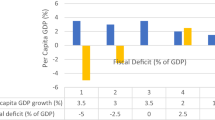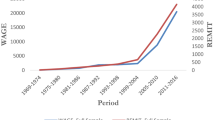Abstract
The discussion on an increase of development aid is overshadowed by uneasiness about job opportunities at home. Against the demands for a sizeable increase of development aid funds it is often argued that such aid draws purchasing power away from the internal market if it is not tied to deliveries by the Federal Republic of Germany. Recent data show however that, since these “ties” were largely abolished in 1973, most funds allocated to development aid have still been flowing back into the Federal Republic in the shape of export orders.
Similar content being viewed by others
References
Cf. Rückwirkungen der Entwicklungszusammenarbeit, Untersuchung des Wissenschaftlichen Beirats beim Bundesministerium für wirtschaftliche Zusammenarbeit (Repercussions of development cooperation, a study of the Economic Advisory Council of the Federal Ministry for Economic Cooperation), in: Entwicklungspolitik, Materialien No. 65, published by Bundesministerium für wirtschaftliche zusammenarbeit, Bonn, April 1980, p. 5.
The following analysis is based on R. Filip-Köhn, R. Krengel, D. Schumacher: Macro-Economic Effects of Disarmament Policies on Sectoral Production and Employment in the Federal Republic of Germany, with Special Emphasis on Development Policy Issues, Report commissioned by the Foreign Office, mimeo., Berlin 1980, p. 37 ff.
Cf. R. Filip-Köhn, R. Krengel, D. Schumacher, op. cit., Macro-Economic Effects of Disarmament Policies on Sectoral Production and Employment in the Federal Republic of Germany, with Special Emphasis on Development Policy Issues, Report commissioned by the Foreign Office, mimeo., Berlin 1980, p. 43 ff.
cf. G. Ashoff, D. Weiss: Einnenwirtschaftliche Wirkungen der deutschen Entwicklungspolitik (Internal economic effects of the German development policy), Berlin 1978, Appendix, p. 5).
Cf. DIW: Struktureller Wandel und seine Folgen für die Beschäftigung—Zwischenbericht zur Strukturberichterstattung (Structural change and its consequences for employment—interim report), mimeo, Berlin 1979, p. 33 and 113.
The board of Experts for Assessment of Overall Economic Trends came to the same conclusion in its report on the general economic development: Herausforderung von Außen (Challenge from outside), annual statement 1979/80, Stuttgart/Mainz 1979, p. 191.
Cf. also S. Schultz, D. Schumacher: Aufstockung der öffentlichen Entwicklungshilfe nützt Entwicklungs- und Industrieländern (Stepping-up the public development aid is of benefit to developing and industrialized countries), in: Wochenbericht des DIW, No. 20/1979.
Author information
Authors and Affiliations
Additional information
The present article was first published in German in Wochenbericht des DIW, No. 8/81.
Rights and permissions
About this article
Cite this article
Schumacher, D. Development aid and employment in the Federal Republic of Germany. Intereconomics 16, 122–125 (1981). https://doi.org/10.1007/BF02924745
Issue Date:
DOI: https://doi.org/10.1007/BF02924745




